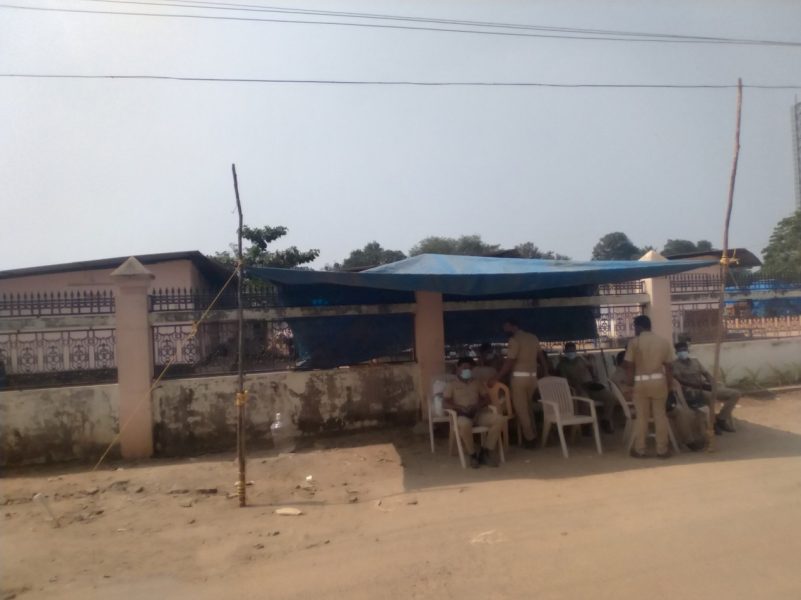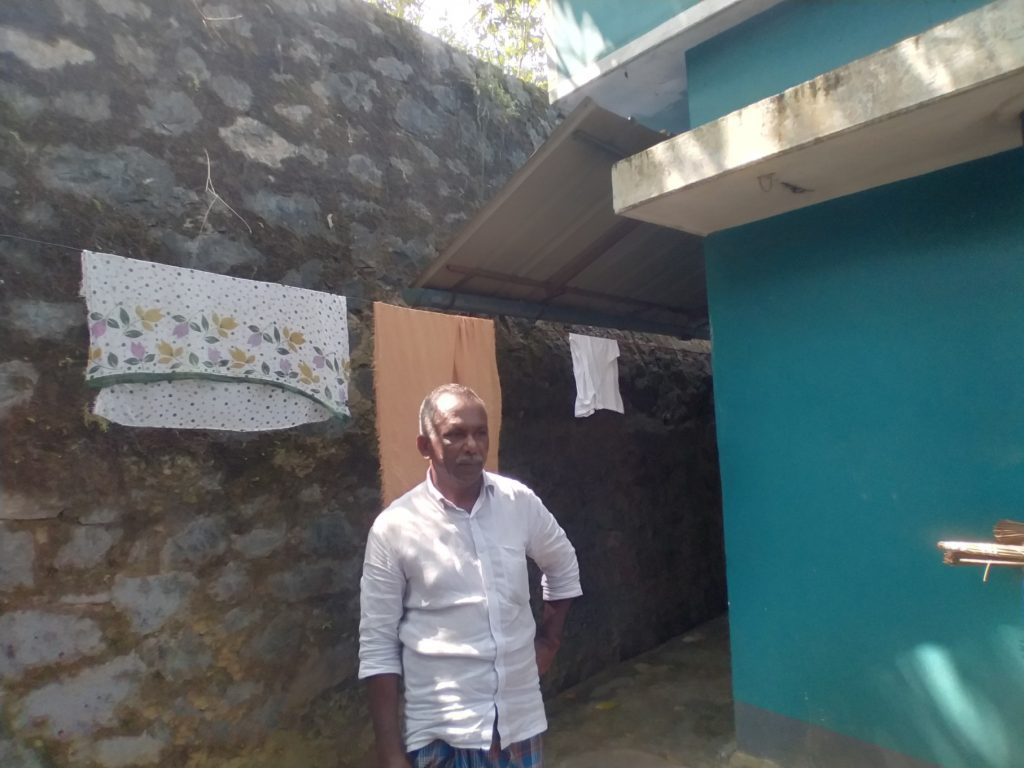
On the spot: What really triggered violence at Kitex labour camp in Kerala?
The violence that erupted on Christmas eve in the labour camp of the Kitex Group of Companies in Kerala was not provoked by a group of migrant workers under the ‘influence of alcohol and drugs'. On a visit to the village, The Federal found that other long-standing issues which have developed over the years in the camp probably caused the ugly clash with the Kerala police that led to the arrest of 150 Kitex labourers from the camp.

The violence that erupted on Christmas Eve in the labour camp of the Kitex Group of Companies in Kerala was not exactly provoked by a group of migrant workers under the ‘influence of alcohol and drugs’.
On a visit to the village, The Federal found that other long-standing issues which have developed over the years in the camp probably triggered the violent clash with the Kerala police that led to the arrest of 150 Kitex workers from the camp.
Firstly, there is growing anger among the workers who have been living for a long time in poor and inadequate conditions. Secondly, there is simmering tension between migrant workers and residents of the area due to the environmental pollution caused by the garment factory. Though social media is awash with xenophobic messages against migrant workers, Kizhakkambalam residents do not harbour any ill will against them. Instead, they are sympathetic towards them and have an entirely different story to tell.
The remnants of the violent clash at the labour camp, located a few meters away from the Kitex factory in Kizhakkambalam, are visible – there is a badly burnt police jeep, a heavily damaged car and footwear scattered all around. The locality is milling with cops but not a single migrant worker is to be spotted outside the camp. Those who emerge from the camp to walk to the factory are too scared to talk to the media. When the media approached them, they would just scurry away saying, ‘we don’t know anything’.
Residents of Kizhakkambalam panchayat living adjacent to the factory however told The Federal that they were not surprised or shocked when they learnt about the violence. On the contrary, many people felt that this was “inevitable” considering the “deplorable living and working conditions” of the labourers in the camp.
Basheer Saithu, who used to work in Saudi Arabia, lives right outside the compound wall of the Kitex camp. He told The Federal that the allegations of alcohol consumption and drug abuse by the migrant workers is partially true. But, he also added that it is not the sole reason for the eruption of violence on Christmas eve.
Also read: Christmas celebrations by migrants turn violent; Kerala police arrest 150

“We used to face a lot of problems from labourers in the company. They would throw empty alcohol bottles into our compound and pluck mangoes from our trees. But we did not think they were big issues and we were only sympathetic towards them,” said Basheer Saithu.
“To my knowledge, it was not a dispute between two groups of migrant workers over Christmas celebrations, but the tussle happened between the security staff and the workers. When they started singing Christmas carols, the security staff asked them to go back to their rooms and to stay inside. These poor people have been locked up in this camp over the last two years under the disguise of COVID,” said Saithu, adding that the workers did not have the freedom to move out to enjoy their leisurely hours.
Sunil Parayil and Surendran are auto drivers at Thaikkavu junction, which is 50m away from the entrance to the camp. While talking to The Federal, both of them unanimously agreed that this violent outbreak has been the culmination of unresolved long-standing problems faced by the workers.
“They revolted. They are almost like bonded labourers, there is no freedom. The security staffers have absolute authority and power upon these poor workers and they even beat them,” said Parayil. “The company authorities are careful and they do not allow them to mingle with us. They have even instructed them not to travel in auto rickshaws here,” added Surendran.
Vineesh V P, who used to run a Xerox shop in this locality, accused the company officials of an “organised attempt” to turn workers against the local people. “This is not a sudden development. They have been organising workers against the people in the locality to counter the protests against environmental pollution caused by the chemical waste produced by the factory since 2012,” said Vineesh.
“Sabu Jacob, the Kitex managing director, had insisted that a liquor outlet run by the Kerala State Beverages Corporation in the locality should be shut down. Where will workers get liquor after the closure of this outlet?” asked Parayil. Locals whom The Federal talked to did not subscribe to the narrative that the violence was triggered by workers under the influence of liquor or drugs.
Mathew Kurian from Idukki, a former employee of Kitex, echoed the same view. He had worked with Kitex group for 17 years till June 2021. “A few workers who were involved in the violence are known to me personally. I’ve talked to them. They were frustrated to the core. Generally, workers suffer a lot of harassment from the middle-level managers and security staffers. Since the outbreak of COVID, workers have been locked up inside and were not given permission to go out,” Mathew told The Federal.
Also read: Low wages, poor sanitation: Kerala labour dept flags violations by Kitex
Twenty-20, the political party formed by the Kitex group, entered electoral politics and won 17 out of the 19 seats in the local body election in 2015. Twenty-20 could not win the sixth ward where Kitex is located. They lost the adjacent fifth ward too in 2015. According to local sources, the party was reportedly unable to convince the people of this ward to vote for them since the residents were bearing the brunt of the environmental pollution caused by the dyeing and bleaching unit in the garment factory.
“They could never win this (sixth) ward, but many of us have faced a lot of hardships including fabricated cases. They have used the migrant labourers to threaten the locals. Now they are reaping what they have sowed, but it has become a serious law and order problem for the whole society,” observed Mohemmad, who runs a bakery in the locality.
Mohemmad, Basheer Saithu, Sunil Parayil, Surendran and many others whom The Federal talked to, have been part of the action committee against environmental pollution caused by the chemical waste produced by the Kitex garment factory. “In 2012, we put up a flex board against pollution. The driver of the vehicle who brought the board was arrested. This led to a dispute between the people and the company authorities. The next day, around thousands of workers, more than half were migrant labourers led a march chanting provocative slogans,” recollected Basheer.
The alleged assailants who burned the police jeep and attacked the cops on Christmas Eve were heard chanting ‘Jai Sriram’ in the video that went viral (the police are yet to confirm the veracity of the video whether it’s a doctored one or not). According to the locals of Kizhakkambalam, communal polarisation has been happening for some time.
Parayil said that during the march organised by the migrant labourers in December 2012, they had allegedly pelted stones at a mosque nearby.
“They were chanting threatening slogans and threw stones at the mosque, though a few cases were filed, the police did not handle the issue seriously,” said Parayil. Most of the people whom The Federal talked to also recollected this incident.
Meanwhile, Sabu Jacob repeatedly told the media that migrant workers were supplied with liquor and drugs by ‘someone outside’. His reference to the migrant labourers from the north-east states invited public wrath for being racist. In a press conference followed by the violent attack on the police, Sabu Jacob said that the workers from Nagaland and Manipur turn violent when they use liquor and drugs.
“This is hate speech,” pointed out P V Srinijan, the MLA of Kunnathunadu constituency, which falls under the Kizhakkambalam panchayat. Srinijan told The Federal that the Kitex group management cannot shun their responsibility. “When the government conducted inquiries into the inhuman living conditions of the workers, Sabu Jacob protested and alleged that he had been harassed. If he would have addressed the problems being faced by the workers earlier, this would not have happened. The management is clearly responsible,” said Srinijan.
He also agreed with the views expressed by the people in the locality. “The violence was the culmination of growing anger, displeasure and disappointment among the workers. They are not even allowed to talk to locals in the area,” pointed out Srinijan.
An inspection conducted by the labour department in July 2021 revealed that the company had violated labour laws including the Minimum Wages Act. According to the labour department report, it was found that the workers were not paid minimum wages and there was no proper sanitation and accommodation facilities provided to them.
The report pointed out that the workers were forced to live in small and untidy rooms and no additional wages were given to them for overtime. After these inspections by various departments, Sabu Jacob had alleged that the government was harassing him and declared that he would leave Kerala and shift his business to Hyderabad.
The government had not taken any action on the report submitted by the labour department with reference to the violation of labour laws allegedly committed by the Kitex Group even after six months of submission. “There is a due process. Notices have been served to the company on the matter,“ said P V Srinijan.

